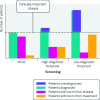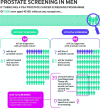Overdiagnosis in primary care: framing the problem and finding solutions
- PMID: 30108054
- PMCID: PMC6889862
- DOI: 10.1136/bmj.k2820
Overdiagnosis in primary care: framing the problem and finding solutions
Abstract
Overdiagnosis, is defined as the diagnosis of a condition that, if unrecognized, would not cause symptoms or harm a patient during his or her lifetime, and it is increasingly acknowledged as a consequence of screening for cancer and other conditions. Because preventive care is a crucial component of primary care, which is delivered to the broad population, overdiagnosis in primary care is an important problem from a public health perspective and has far reaching implications. The scope of overdiagnosis as a result of services delivered in primary care is unclear, though overdiagnosis of indolent breast, prostate, thyroid, and lung cancers is well described and overdiagnosis of chronic kidney disease, depression, and attention-deficit/hyperactivity disorder is also recognized. However, overdiagnosis is a known consequence of all screening and can be assumed to occur in many more clinical contexts. Overdiagnosis can harm patients by leading to overtreatment (with associated potential toxicities), diagnosis related anxiety or depression, and labeling, or through financial burden. Many entrenched factors facilitate overdiagnosis, including the growing use of advanced diagnostic technology, financial incentives, a medical culture that encourages greater use of tests and treatments, limitations in the evidence that obscure the understanding of diagnostic utility, use of non-beneficial screening tests, and the broadening of disease definitions. Efforts to reduce overdiagnosis are hindered by physicians' and patients' lack of awareness of the problem and by confusion about terminology, with overdiagnosis often conflated with related concepts. Clarity of terminology would facilitate physicians' understanding of the problem and the growth in evidence regarding its prevalence and downstream consequences in primary care. It is hoped that international coordination regarding diagnostic standards for disease definitions will also help minimize overdiagnosis in the future.
Published by the BMJ Publishing Group Limited. For permission to use (where not already granted under a licence) please go to http://group.bmj.com/group/rights-licensing/permissions.
Conflict of interest statement
Competing interests: The authors have read and understood BMJ policy on declaration of interests and declare that we have no interests.
Figures




References
-
- WHO. The world health report 2008: primary health care now more than ever. WHO, 2008. http://www.who.int/whr/2008/en/
Publication types
MeSH terms
Grants and funding
LinkOut - more resources
Full Text Sources
Other Literature Sources
